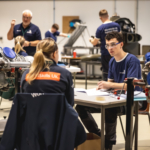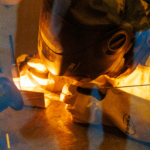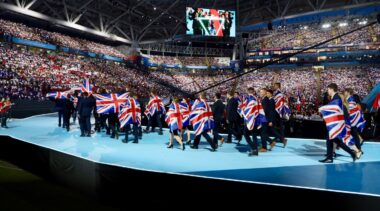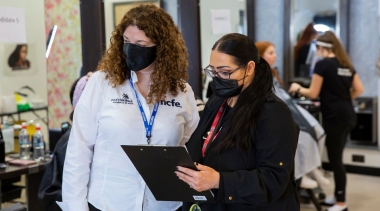At WorldSkills UK, we use international best practice to raise standards in apprenticeships and technical education. But what does this actually look like? I spoke to some of our amazing training managers, who work within our global WorldSkills network and oversee the development of Squad UK, to discover tangible examples of what they’ve learned from working internationally. And more importantly, how they’ve passed this information onto students and apprentices within the UK. Here are just some examples of what they told me:
“I have attended many training events with international counterparts over the years and there are always lessons to be learned through the sharing of best practice. For example, in floristry by teaching all learners to use a knife for cutting stems. This is standard practice across Europe and Asia but in the UK floristry scissors are used which effectively cause the stem to be compressed and crushed which hinders water uptake. By demonstrating the skill early on and giving sufficient time for learners to practice with varied stem structures, confidence and ability quickly builds. This is just one technical example of an aspect that can raise standards, there are numerous others.”
Laura Leong, Floristry Training Manager
“At a Nordic competition in Denmark leading up to the Abu Dhabi international competition I learned of the attention to detail needed to get maximum marks for each marking aspect. As a result, I now split my students into groups of three and they will peer assess each other’s work at the end of the assessment. I will take my time to explain/show the required standard for each aspect and show them how they can achieve maximum marks for each aspect. If you do this from the off when they start in September you notice straight away that all students are pushing to achieve a higher standard of repair rather than just settling for that’ll do. By doing so, this has raised standards within my department.”
“My experience of joint training with France highlighted the importance of health and nutrition for the competitors in achieving performance at the highest level. Competitors have designated health and nutrition coaches to support healthy lifestyle development. During the Restaurant Service competition, it is essential that the competitors have a high level of energy as they have to walk, stand and bend for a long time with correct posture and stance during each task, which is assessed throughout the competition by judges as part of the process. We’ve taken on board these insights from France and embedded this practice during the start of training for the current cohort for WorldSkills Shanghai. This has also been added as part of the personal attributes assessment which is carried out on a continuous basis.”
Shyam Patiar, Restaurant Service Training Manager
From observing competitors from different countries and talking to international experts, I learned how to effectively and accurately prepare organic samples analysis. We particularly learned from WorldSkills Russia who we subsequently invited as guest competitor and judge to the UK National Finals so we could share this knowledge with tutors from other UK organisations. My colleague and I have since adapted the theoretical and practical teaching of High Performance Liquid Chromatography (HPLC) analysis for BSc Biochemistry students in year 2 and 3.
“At an International Competition in Beauty Therapy, I have learned how the attention to detail shown by all of the therapists can lead to more effective results for the client. For example, in a lash or brow tint, I would apply the tint liberally expecting all lashes to be covered. At WorldSkills, the therapists use a magnifying lamp to check each and every lash is covered from all sides of the couch. This in turn creates a stronger result for the client. I now pass this learning onto my students from the start. If criteria for excellence is incorporated as standard in the first demonstration, then excellence becomes a habit.”
Jenna Wrathall Bailey, Beauty Therapy Training Manager
Since learning more about building automation, I have been able to incorporate more aspects of this into my teaching. More and more learners are using modern wiring methods on site, such as data cabling for light switches. KNX is the global standard in building automation that is associated with electrical installations. My involvement with WorldSkills to date has given me the opportunity to update and raise my understanding in this area, which in turn has helped me raise both the standard of my learners along with other members of staff.
“At an International Pressure Test training competition, we learned how to improve accurate matching of wallcoverings on internal corners using two lengths of wallpapers at the same time. The cut off section from length one, which would normally be used to come round the corner on to wall two, can be used to accurately measure length two with a 10mm overhang. This would be used on wall two and then be accurately trimmed in the corner with perfect match and no pattern loss. I use and deliver this method to Painting and Decorating apprentices and have also shared this method with Painting and Decorating staff within my college and external P&D teaching colleagues for them to deliver with their painting and decorating students.”
Mike Swan, Training Manager for Painting and Decorating
These are just some very tangible examples of how we are learning from our peers around the world. To be the best, we need to learn from the best so we’re always utilising our amazing global network and picking up skills from our counterparts. Most importantly we’re passing them onto other educators within the UK skills network and their students and apprentices.





